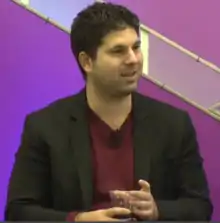Scott Barry Kaufman
Scott Barry Kaufman (born June 3, 1979) is an American humanistic psychologist, author, podcaster, and popular science writer. His writing and research focuses on intelligence, creativity, and human potential. Most media attention has focused on Kaufman's attempt to redefine intelligence.[1][2][3]
Scott Barry Kaufman | |
|---|---|
 Aspen Ideas Festival 2014 | |
| Born | June 3, 1979 Penn Wynne, Pennsylvania, U.S. |
| Nationality | American |
| Scientific career | |
| Fields | Humanistic Psychology Positive Psychology Cognitive Science Educational Psychology |
| Institutions | Columbia University New York University University of Pennsylvania |
| Website | http://www.scottbarrykaufman.com |
Kaufman has taught at Columbia University, NYU, the University of Pennsylvania, and elsewhere. He has written a number of books and writes regularly for Scientific American. In 2015, he was named one of “50 groundbreaking scientists who are changing the way we see the world” by Business Insider.[4]
Education
Kaufman received his B.S. from Carnegie Mellon University, where he was Herbert A. Simon's last research assistant, and a student of Randy Pausch. In 2005, he received his M.Phil. from King's College, Cambridge under a Gates Scholarship, where he worked with Nicholas Mackintosh. After Cambridge, Kaufman earned his Ph.D. in Cognitive Psychology from Yale University where he was mentored by Robert Sternberg, Jeremy R. Gray, and Jerome L. Singer. From 2009-2010, he was a post-doctoral fellow at the Center Leo Apostel for Interdisciplinary Studies.
Research
The dual-process theory of human intelligence
Most theories of human intelligence and tests of intelligence emphasize controlled and deliberate reasoning as the hallmark of human intelligence. While agreeing that such thought processes are an important component of intelligence, Kaufman argues that spontaneous forms of thinking such as insight, imaginative play, daydreaming, implicit learning, and a reduced latent inhibition are also important contributors to a wide range of intelligent behaviors as well as creativity.[5][6] Integrating modern dual-process theories of cognition with research on human intelligence, Kaufman proposed the dual-process theory of human intelligence.[7][8][9][10] The theory emphasizes the importance of adaptation to task demands as the essence of intelligent functioning. At the same time, the theory takes into account an individual's personal goals and accommodates a wide range of intelligent behaviors in a wide range of fields, from the arts to the sciences. A key assumption of the theory is that abilities are not static entities but are constantly changing throughout the life span as the person continually engages with controlled and spontaneous modes of thought. In Ungifted: Intelligence Redefined, Kaufman expanded his dual-process theory to make the point that his theory is also fundamentally developmental, because it views intelligence as the dynamic interplay of engagement and ability over time in the pursuit of personal goals. [11]
Light triad
Influenced by the dark triad theory of antisocial personalities, Kaufman is researching a proposed "light triad" of personality virtues: humanism, Kantianism, and faith in humanity.[12]
Bibliography
Books
- Transcend: The New Science of Self-Actualization (2020) New York, NY: TarcherPerigee. (ISBN 0-143-13120-6)
- Twice Exceptional: Supporting and Educating Bright and Creative Students with Learning Difficulties (2018) New York, NY: Oxford University Press. (ISBN 0-190-64547-4)
- Wired to Create: Unraveling the Mysteries of the Creative Mind (with Carolyn Gregoire) (2015) New York, NY: TarcherPerigee. (ISBN 0-399-17410-9)
- The Philosophy of Creativity (with Elliot Samuel Paul) (2014). New York, NY: Oxford University Press. (ISBN 0-199-83696-5)
- The Complexity of Greatness: Beyond Talent or Practice (2013) New York, NY: Oxford University Press. (ISBN 0-199-79400-6)
- Ungifted: Intelligence Redefined (2013). New York, NY: Basic Books. (ISBN 0-465-02554-4)
- Mating Intelligence Unleashed: The Role of the Mind in Sex, Dating, and Love (with Glenn Geher) (2013). New York, NY: Oxford University Press. (ISBN 0-195-39685-5)
- The Cambridge Handbook of Intelligence (with Robert J. Sternberg) (2011). New York, NY: Cambridge University Press. (ISBN 0-521-73911-X)
- The Psychology of Creative Writing (with James C. Kaufman) (2009). Cambridge, UK: Cambridge University Press. (ISBN 0-521-70782-X)
References
- Why We Need to Redefine Intelligence, Harvard Business Review IdeaCast, 13 June 2013.
- Redefining Intelligence Archived 2013-06-18 at the Wayback Machine, The Leonard Lopate Show- WNYC, 13 June 2013.
- Beyond IQ: 5 Ways to Reframe Success and Smarts, Fast Co.Create, 13 June 2013.
- Martin, Jessica Orwig, Emmie. "50 groundbreaking scientists who are changing the way we see the world". Business Insider. Retrieved 2020-06-21.
- Dreams of Glory, Psychology Today, March 2014.
- Why Daydreamers Are More Creative, Beautiful Minds, 27 February 2011.
- Kaufman, S. B. (2009). Beyond general intelligence: The dual-process theory of human intelligence (Unpublished Ph.D. dissertation). Yale University, New Haven, CT.
- Kaufman, S.B. (2011). Intelligence and the cognitive unconscious. In R.J. Sternberg & S.B. Kaufman (Eds.), The Cambridge Handbook of Intelligence (pp. 442-467). Cambridge, UK: Cambridge University Press.
- Kaufman, J.C., Kaufman, S.B., & Plucker, J.A. (2013). Contemporary theories of intelligence. In J. Reisberg (Ed.), The Oxford Handbook of Cognitive Psychology (pp. 811-822). New York, NY: Oxford University Press
- 6 Clues to Character, Psychology Today, 15 December 2011.
- Book Review - Ungifted: Intelligence Redefined, Creativity Post, June 14, 2013
- Oakes, Kelly. "The 'light triad' that can make you a good person". BBC. Retrieved 29 June 2019.